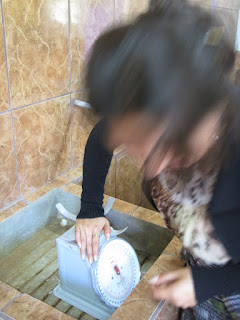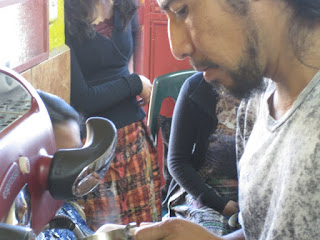
Before I left Guatemala for the holidays, the directors at FEDEPMA asked me to teach a course on coffee prep for some workers, friends, and associates of the cooperative, since we have an espresso machine that nobody knew how to use, and we're thinking about setting up a cafe as an additional source of income.
I didn't really understand how overwhelming it was going to be before I started working on it, and of course I procrastinated and didn't do any work while stateside. First of all, I haven't taught anything in a semi-formal fashion since the last time I taught swim lessons. Fall 2007. It's been a while. Second, coffee geek language and concepts are hard enough to explain in English. Trying to find the words in Spanish to explain "over-extraction," "settling and distributing the grinds," "even tamping," "blonding," "stretching the milk," etc. was a lot more time-consuming than I expected. Third, even though most of the teaching was hands-on and demonstrative, I did use PowerPoint for some of the theoretical explanations. I forgot how much I hate Powerpoint.

Bane of my existence.
The positives of the experience with a few pictures first, then a bit on my sort-of boss at FEDEPMA, Doña Loida, and other sources of frustration during the past three days.
The pluses:
1. Coffee: Obviously, I like coffee, and learning more about it is part of the reason I came to Guatemala and started volunteering/working at FEDEPMA. Teaching and lesson planning forced me to learn a lot more about coffee and how to explain it, both in English and Spanish. Also a good reminder that I am a nerd (about bikes, coffee, etc.).

2. Behind the bar: even though there were days in DC when I thought I wasn't that great at it, I do miss working the espresso machine. I think it's safe to say Stacy feels the same way. So this was a good time to play around a little bit and make some drinks. Stacy also helped me figure out why sometimes my milk was inconsistent, so I think this week helped me improve my skills a bit too. Bonus lesson for me.

Steam the milk.
Bury the milk.
Admire the day's winning pour.

Not the winning pour.
3. Teaching: honestly, it feels good to help people learn. And more than that, it's refreshing to see people who are interested in learning, and to watch them get better at pulling shots, pouring, or whathaveyou.

Bilson, distributing some grounds.

Ahhh, so this is what 30-40 lbs of pressure feels like.

Vicenta, with her own pretty damn good cappuccino.
4. Nuevos amigos: Met a few new people during the seminar, which is always a good thing.
 Luis, full concentration on the milk.
Luis, full concentration on the milk.
5. Language improvement: Teaching (and being corrected by Guatemalans about how some of my colloquial translations just didn't make sense) helped me learn some new vocab and reinforced the fact that I have to work on several things I say wrong all the time, without any good reason (el leche, por ejemplo). I think it helped Stacy, too, who was basically co-teaching the whole time.
Now, the frustrations:
1. The colloquial language barrier: already mentioned, but holy crap, we have so many subtly-different words in English, not including coffee slang. Trying to explain techniques and coffee flavors (besides it tastes like coffee) was not easy.
2. The setting: we don't have a permanent place to set up the espresso machine or other coffee equipment. Which meant that every morning I had to move an 80 lb espresso machine to a new location. Not ideal for the espresso machine, and it's nerve-wracking because the machine costs at least $3000 dollars. Dropping it would have been a huge bummer.
The espresso machine also takes an hour to warm up. This was a problem for day 3, when the two people who have keys to the room we used forgot themat home, and I couldn't turn on the machine until 10 min before the scheduled start of class.

The sanitation station: Day 3 we were in a room right next to the coffee processing equipment.
3. I let Perla set up the PowerPoint one day and she put a virus on my USB memory drive.
4. Too many people. 11 people trying to learn on one single-grouphead espresso machine just doesn't work. Way to crowded for any personal space, and it's tough for everyone to get a turn. Plus, with 7 Guatemalan women bickering in Tzutujil, I believe the class was what Herb Williams calls a "hen party."
 The espresso machine is only 15" wide. There are way too many people in this picture.
The espresso machine is only 15" wide. There are way too many people in this picture.5. Frustration breeds apathy. This happens when teaching or learning anything new, but for a few participants, difficulty pulling good shots, steaming milk, or pouring led to a whatever attitude. It's not easy to do it well, so messing up a few times, particularly when the teacher can't explain things very well, shouldn't be a surprise...

Yeah! This is fun!

Ugghh...this is not easy. Eff cappuccinos, I'm sticking to instant.
6. Doña Loida Margarita: Holy crap, my boss is some type of insane looney tunes character. The woman can be so endearing some times, but drives me insane on other days, like all three days of this course. Definitely only listened about half of the time, and didn't really ever figure out espresso, but did feel like she could tell everyone what they were doing wrong.
 "Hi Kevin, this is my 'I'm pretending to listen, but I'm definitely not' face."
"Hi Kevin, this is my 'I'm pretending to listen, but I'm definitely not' face." Boss of the portafilter.
Boss of the portafilter. Tamping while resting the portafilter on its spout is the 2011 sign for care and precision.
Tamping while resting the portafilter on its spout is the 2011 sign for care and precision. Get it.
Get it.
"You're doing something wrong, and I feel like telling you about it."


No hay comentarios:
Publicar un comentario